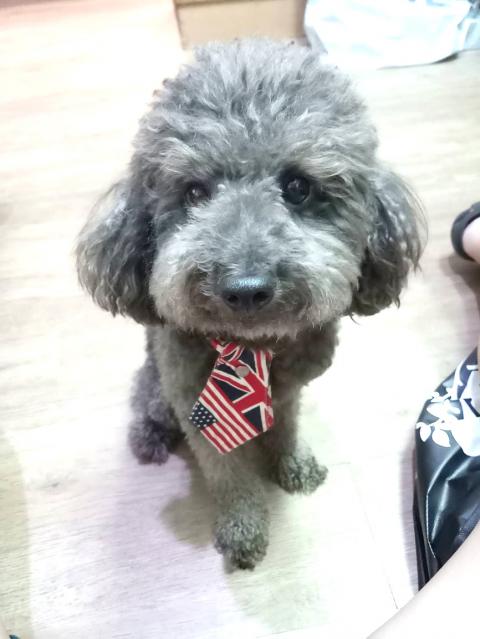Lawmakers and animal rights advocates yesterday discussed the feasibility of legislation similar to England’s so-callled “Lucy’s Law,” which prohibits pet shops or dealers from selling puppies and kittens younger than six months.
Dozens of animal lovers, animal welfare groups, academics, legislators and representatives of pet breeders and commercial dealers attended a conference at National Taiwan University’s School of Veterinary Medicine in Taipei to discuss ways to eliminate puppy and kitten mills, and the abuse and health problems associated with such breeding practices.
Lucy’s Law was passed by the British Parliament in October last year and announced by British Undersecretary of State for Food and Animal Welfare David Rutley on Dec. 23. It only applys to England.

Photo: Yang Hsin-hui, Taipei Times
The law aims to “put an end to unnecessary animal cruelty and help eradicate forms of irresponsible dog breeding and selling, such as puppy farming, smuggling and trafficking.”
Georny Liu (劉偉蘋), chief executive of Supporting Team Social Enterprise and the organizer of yesterday’s conference, said Lucy’s Law forces anyone looking to buy or adopt a puppy or kitten to either deal directly with a breeder or with an animal rehoming center, which might help protect animals by holding breeders accountable and making the process transparent.
“I believe the mechanism is worthy of referring to, because heartless breeders do exist,” Liu said, adding that responsible pet ownership should not start with the purchase of pet, but from the moment a person decides they want one.
People should seriously think about the process and see the pet interacting with its mother where it was born, she said.
A random survey the Supporting Team Social Enterprise conducted of pet shops showed that dealers often have no idea where the puppies they sell come from, Liu said, citing the Taichung Animal Protection and Health Inspection Office’s investigation of a registered commercial puppy breeding mill, which was found to have kept dogs in an unhealthy environment, leading to the loss of its license on March 6.
Banning third-party sales would make animal lovers the gatekeepers of legal and responsible pet breeders, increase difficulty for people to become pet owners to reduce the risk of impulsive buying or pet abandonment, and promote adoption of crossbreed pets, she said.
However, hastily enacted laws create more problems, Liu said, citing the push for a “zero euthanasia” policy at animal shelters.
A discussion about the feasibility of a similar Lucy’s Law for Taiwan is good, but the main goal should be to improve the welfare of animals in breeding situations and encourage responsible pet ownership, Liu said.
Such a law could also help commercial dealers transform their business models, she said.
Lee Rung-feng (李榮峰), board director of Not Only Environment, a non-governmental organization working to end mistreatment of animals, said it is difficult to crack down on unethical breeding mills, as evidence is difficult to obtain and new operations are established regularly.

Taiwanese can file complaints with the Tourism Administration to report travel agencies if their activities caused termination of a person’s citizenship, Mainland Affairs Council Minister Chiu Chui-cheng (邱垂正) said yesterday, after a podcaster highlighted a case in which a person’s citizenship was canceled for receiving a single-use Chinese passport to enter Russia. The council is aware of incidents in which people who signed up through Chinese travel agencies for tours of Russia were told they could obtain Russian visas and fast-track border clearance, Chiu told reporters on the sidelines of an event in Taipei. However, the travel agencies actually applied

Japanese footwear brand Onitsuka Tiger today issued a public apology and said it has suspended an employee amid allegations that the staff member discriminated against a Vietnamese customer at its Taipei 101 store. Posting on the social media platform Threads yesterday, a user said that an employee at the store said that “those shoes are very expensive” when her friend, who is a migrant worker from Vietnam, asked for assistance. The employee then ignored her until she asked again, to which she replied: "We don't have a size 37." The post had amassed nearly 26,000 likes and 916 comments as of this

New measures aimed at making Taiwan more attractive to foreign professionals came into effect this month, the National Development Council said yesterday. Among the changes, international students at Taiwanese universities would be able to work in Taiwan without a work permit in the two years after they graduate, explainer materials provided by the council said. In addition, foreign nationals who graduated from one of the world’s top 200 universities within the past five years can also apply for a two-year open work permit. Previously, those graduates would have needed to apply for a work permit using point-based criteria or have a Taiwanese company

The Shilin District Prosecutors’ Office yesterday indicted two Taiwanese and issued a wanted notice for Pete Liu (劉作虎), founder of Shenzhen-based smartphone manufacturer OnePlus Technology Co (萬普拉斯科技), for allegedly contravening the Act Governing Relations Between the People of the Taiwan Area and the Mainland Area (臺灣地區與大陸地區人民關係條例) by poaching 70 engineers in Taiwan. Liu allegedly traveled to Taiwan at the end of 2014 and met with a Taiwanese man surnamed Lin (林) to discuss establishing a mobile software research and development (R&D) team in Taiwan, prosecutors said. Without approval from the government, Lin, following Liu’s instructions, recruited more than 70 software